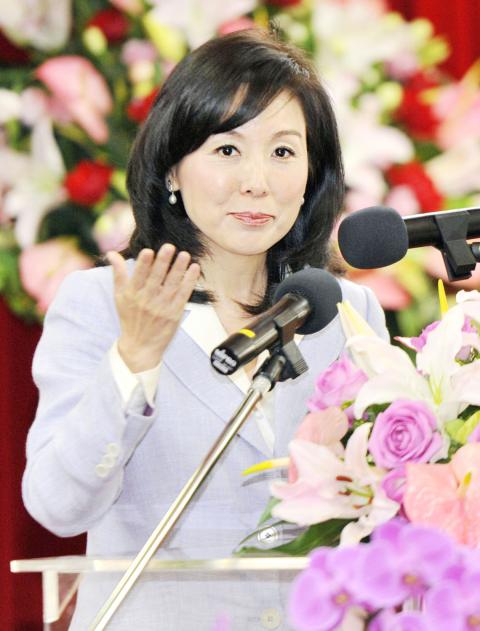New Chunghwa Post chairwoman Lee Jih-chu (李紀珠) said yesterday that she would increase communications with officials at the Financial Supervisory Commission (FSC) to assure the commission that the postal firm will only take bearable risks if it is allowed to expand its business operations to the financial sector.
Lee replaced Oliver Yu (游芳來), who is scheduled to retire this month.
Minister of Transportation and Communications Yeh Kuang-shih (葉匡時) said that Lee was mainly recruited to manage the postal savings fund, which has exceeded NT$500 billion (US$16.6 billion).

Photo: Chen Chih-chu, Taipei Times
“It is important for us to find ways to use this huge amount of money to effectively fund public works,” Yeh said.
“Meanwhile, we also have to make sure that the investment is safe because the money is from the general public” he said.
“Chairwoman Lee has extensive experience and many contacts in the financial sector, and we hope that she will find effective ways to use the fund,” he added.
However, while Lee served as the FSC’s deputy chairperson, the proposal to use the postal savings fund to invest in the nation’s public infrastructure projects was rejected by the commission.
Asked what it was like to see her status change from a “referee” to a “player,” Lee said that she has no problem adjusting to such a change and promised to enhance communications with financial officials.
“The problem lies in the fact that it [the postal company] does not know how to communicate with the administrative agency in charge [FSC], to assure them that doing so [expanding the postal company’s business operations to the finance sector] would not increase risks, or the company would only bear risks within a controllable range,” she said.
“Whether it is the postal savings fund or premiums we have collected through our life insurance plans, we all have an obligation to use the money wisely because it is from the nation’s middle and working class … It would hurt the company in the long run if it is continuously denied the opportunity to develop,” Lee said.
Lee said that she has met with the central bank Governor Perng Fai-nan (彭淮南), who said that he would “actively assist” the postal firm in offering savings account services in Chinese yuan and US dollars.
She added that the service could become available this year if the central bank approves her proposal.
Lee also said that there are different ways to invest in public infrastructure projects, including offering loans or buying bonds issued for these projects.
She said that she would have to see which option the postal company is best equipped to handle.
Private life insurance operators have opposed the postal company’s plan to expand its life insurance operation.
In response, Lee said that everyone should be open to the competition in the market.
Lee also said that the postal firm has a number of advantages, namely its employees and its corporate image, more than 2,500 service locations, 30 million savings and checking accounts, NT$500 billion in cash flow, information about a huge client base and a strong logistics system.
The key, she said, is to integrate these resources.

Alain Robert, known as the "French Spider-Man," praised Alex Honnold as exceptionally well-prepared after the US climber completed a free solo ascent of Taipei 101 yesterday. Robert said Honnold's ascent of the 508m-tall skyscraper in just more than one-and-a-half hours without using safety ropes or equipment was a remarkable achievement. "This is my life," he said in an interview conducted in French, adding that he liked the feeling of being "on the edge of danger." The 63-year-old Frenchman climbed Taipei 101 using ropes in December 2004, taking about four hours to reach the top. On a one-to-10 scale of difficulty, Robert said Taipei 101

Nipah virus infection is to be officially listed as a category 5 notifiable infectious disease in Taiwan in March, while clinical treatment guidelines are being formulated, the Centers for Disease Control (CDC) said yesterday. With Nipah infections being reported in other countries and considering its relatively high fatality rate, the centers on Jan. 16 announced that it would be listed as a notifiable infectious disease to bolster the nation’s systematic early warning system and increase public awareness, the CDC said. Bangladesh reported four fatal cases last year in separate districts, with three linked to raw date palm sap consumption, CDC Epidemic Intelligence

Two Taiwanese prosecutors were questioned by Chinese security personnel at their hotel during a trip to China’s Henan Province this month, the Mainland Affairs Council (MAC) said yesterday. The officers had personal information on the prosecutors, including “when they were assigned to their posts, their work locations and job titles,” MAC Deputy Minister and spokesman Liang Wen-chieh (梁文傑) said. On top of asking about their agencies and positions, the officers also questioned the prosecutors about the Cross-Strait Joint Crime-Fighting and Judicial Mutual Assistance Agreement, a pact that serves as the framework for Taiwan-China cooperation on combating crime and providing judicial assistance, Liang

US climber Alex Honnold left Taiwan this morning a day after completing a free-solo ascent of Taipei 101, a feat that drew cheers from onlookers and gained widespread international attention. Honnold yesterday scaled the 101-story skyscraper without a rope or safety harness. The climb — the highest urban free-solo ascent ever attempted — took just more than 90 minutes and was streamed live on Netflix. It was covered by major international news outlets including CNN, the New York Times, the Guardian and the Wall Street Journal. As Honnold prepared to leave Taiwan today, he attracted a crowd when he and his wife, Sanni,